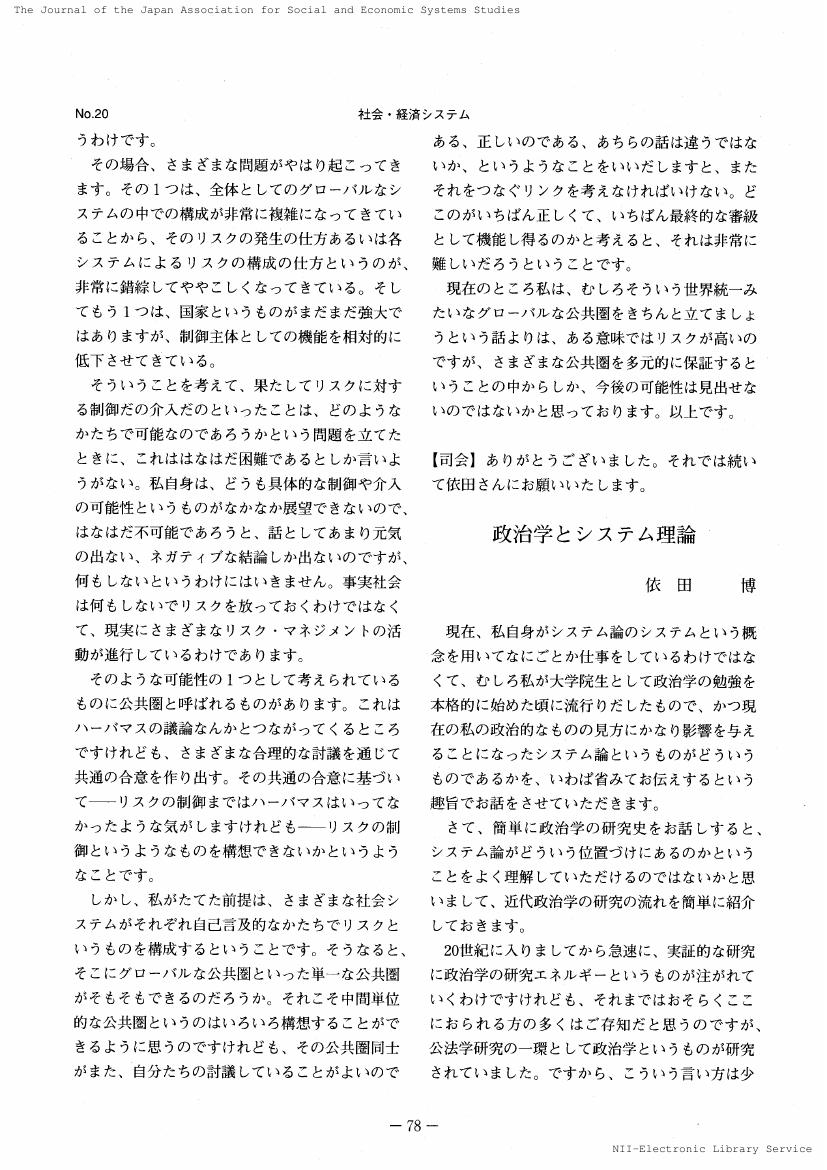11 0 0 0 OA 自民党派閥と政治家族 : 出世民主主義の危機
- 著者
- 依田 博
- 出版者
- 社会・経済システム学会
- 雑誌
- 社会・経済システム (ISSN:09135472)
- 巻号頁・発行日
- vol.10, pp.59-63, 1991-10-25 (Released:2017-07-28)
Since mid-seventies, a number of the Diet members, especialy LDP (Liberal Democratic Party) Diet members, recruited from 'political families' has gradually increased. On the 39th General Election in 1990, LDP won 288 seats in the Diet, and a nember of LDP Diet nembers who are recruited from political families is 121. Most candidates seeking for a seat in the Diet have a privately owned organization(so called 'Kouenkai')to make it to collect votes in order to get elected. Leaders of this organization and candidate oneself cooperatively from the interest community in which their interest would be expected to be maintained and increased by a politicain executing his / her political influence. Thrire desire is that the interest community is inherited by the legitimate inheritor who should be a member of political family, and they truely fear disappearing its interest community as a result of nobody inheriting its organization. This is the reason of the increasing number of Diet members from political families. This is the crisis of Status Democracy in the political field in Japan which has been one of principles in modern society.
1 0 0 0 OA 政治学とシステム理論(問題提起,シンポジウム:社会経済システム分析のフロンティア)
- 著者
- 依田 博
- 出版者
- 社会・経済システム学会
- 雑誌
- 社会・経済システム (ISSN:09135472)
- 巻号頁・発行日
- vol.20, pp.78-97, 2001-11-01 (Released:2017-07-28)
1 0 0 0 IR 国際社会の中の国家--比較国家論の試み
- 著者
- 依田 博 YODA Hiroshi
- 出版者
- 京都女子大学
- 雑誌
- 現代社会研究科論集 (ISSN:18820921)
- 巻号頁・発行日
- no.1, pp.39-64, 2007-03
本論文の目的は、ギデンズによる地政学的観点からの現代国家の類型に基づいて国家の多様性を示すことにある。そして、現代国家の地政学的位置は、当該国家の国内の政治経済状況の変化の影響を最も強く受ける、という仮説を検証する。冷戦が終結した現在、アメリカ合衆国が唯一の「中軸的/覇権的国家」であり、日本は、一貫して「中心的/(アメリカとの)同盟国家」である。中国とインドは、「中心的/非同盟国家」であり、中国は、安保理常任理事国としての国際的なスケールでの中心的国家であり、インドは、南アジア圏のそれである。インドが安保理常任理事国になると、国際的なスケールでの中心的国家になる可能性がある。両国は、長期にわたって国境紛争をかかえており、いずれも核保有国であり、中心的/非同盟国家としてライバル関係にある。また、かつてはいずれも帝国主義的な領域支配の野心を持たない「帝国」としての歴史を持っていたが、19世紀から20世紀前半にかけての帝国主義時代に領域を帝国主義国に蹂躙された経験を経て、両国は、現代的な中軸的/覇権的国家へと移行する可能性がある。つまり、国家がどのような姿を示すのかは、その国民がどのような政治体制のあり方を望むのかによってのみ決定されるのではなく、国際関係のあり様にも影響を受けるのである。The purposes of this paper are to identify the patterns of international relation of nation states from point of view of geopolitics, and to verify the hypothesis that the geopolitical position of any nation state would be influenced by a change of the international relation and internal conditions of the nation states. Most important elements of internal conditions are population, GDP, and military.
1 0 0 0 OA アカデミック・エッセー・ライティングのコツ
- 著者
- 依田博
- 出版者
- 京都文教大学
- 雑誌
- 人間学部研究報告 (ISSN:18843743)
- 巻号頁・発行日
- vol.14, pp.15-45, 2012

